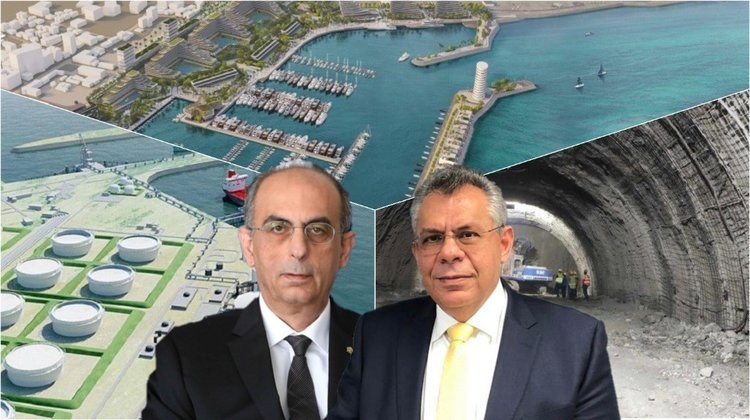How the business world views the barrage of public works contract terminations
Charalambos Charalambous 07:38 - 19 November 2024

Cyprus Employers & Industrialists Federation (OEB) Director General Michalis Antoniou and Cyprus Chamber of Commerce and Industry (CCCI) Secretary General Marios Tsiakkis have intervened in the debate that has recently been developing more and more intensely in relation to the suspension of contracts with the contractors of large public works.
Against the background of the government's barrage of termination of contracts for projects such as the terminal, the development of the marina and the port of Larnaca, the electronic justice system (e-justice), the Paphos-Polis Chrysochous road, and also the fishing shelter and Liopetriou River works, Antoniou and Tsiakkis shared the business world's view of issue with InBussinessNews, submitting opinions, as well as their suggestions for remedying the situation.
They both suggest that the source of the problem is the way in which public contracts have been entered into until now, while at the same time they agree that, depending on the conditions and specificities of each project, the termination of a contract is one way to get a project's implementation back on track.
Michalis Antoniou: The root of the problem is public contracts
The termination of a project contract is one of the options offered, in order to achieve damage limitation, with a new plan of action, OEB Director General Michalis Antoniou told InBusinessNews , noting that the termination of large project contracts is a phenomenon that has occurred a number of times during the history of the Republic, with its frequency increasing recently.
At the same time, he added that the interruption of projects is obviously a negative development for all- the citizens, the business community, the contractor, the contracting authority and the State.
Asked if there were alternative ways, instead of terminating the contracts, that the government could proceed with, Antoniou replied that in order for someone to be able to evaluate the incidents and propose more advantageous alternatives for the Republic, he must have a complete picture of each individual project and the data that led to the decision.
Safety valves
According to the Director General of OEB, the root of the problem is public contracts, with Antoniou in favour of the formation of a mechanism, which would ensure 'safety valves' for the projects and alternative solutions being integrated into the contracts, in a way that ensures that the projects will be completed on time and within the calculated cost.
"We have experience of large projects and know that deviations occur on both points, but the percentage of deviation must be predetermined and acceptable to both sides," he added.
Marios Tsiakkis: The contractor should face criminal consequences
"Certainly, the forced interruption of projects is not pleasant," the Secretary General of the CCCI Marios Tsiakkis told InBusinessNews, adding that the CCCI cannot know the full details of these decisions and that, based on what has been written in the press, it appears that the projects were well behind schedule and that there was possibly subcontractor difficulty in completing the projects.
"In this sense, the decision to suspend the work may be correct, in order to start a new process and find other subcontractors, who can complete it," Tsiakkis added.
According to him, this fact brings to the surface the serious weaknesses that the system of tendering and awarding projects in Cyprus seems to have, since, over time, the vast majority of projects are either not completed within the stipulated timescales or cost more than what was foreseen.
"We absolutely need to look at the way in which bids are made and evaluated and projects are awarded, to ensure that those who undertake them, deliver them within the timescales and with the budgets they commit to when they submit the bids," Tsiakkis underlined.
The wrong practices
As the Secretary General of the CCCI pointed out, over time, it seems that contractors take on projects, possibly knowing that they may not be able to complete them at the predicted cost and within the schedules and "because they and the state are trapped in a process, and delays and additional requirements arise along the way."
Nor is the logic of the cheapest bidder necessarily the best, he added, since as Tsiakkis said, in practice it has been proven that the cheapest bidder is not always the best and most suitable to complete a project.
The CCCI believes the the root of the problem is in public contracts and in the conditions of each contract, which as the Chamber pointed out should be clearer, while it also suggests arbitration - a much faster process - as a possible solution through which, after evaluation, a decision to continue the project can be found.
At the same time, Tsiakkis emphasises that the contractor should be faced with criminal consequences in the case of non-completion of a project, since, as he pointed out, at the end of the day "he undertakes a project, does not complete it, has no costs and is permitted to move on to next process."
(Source: InBusinessNews)

